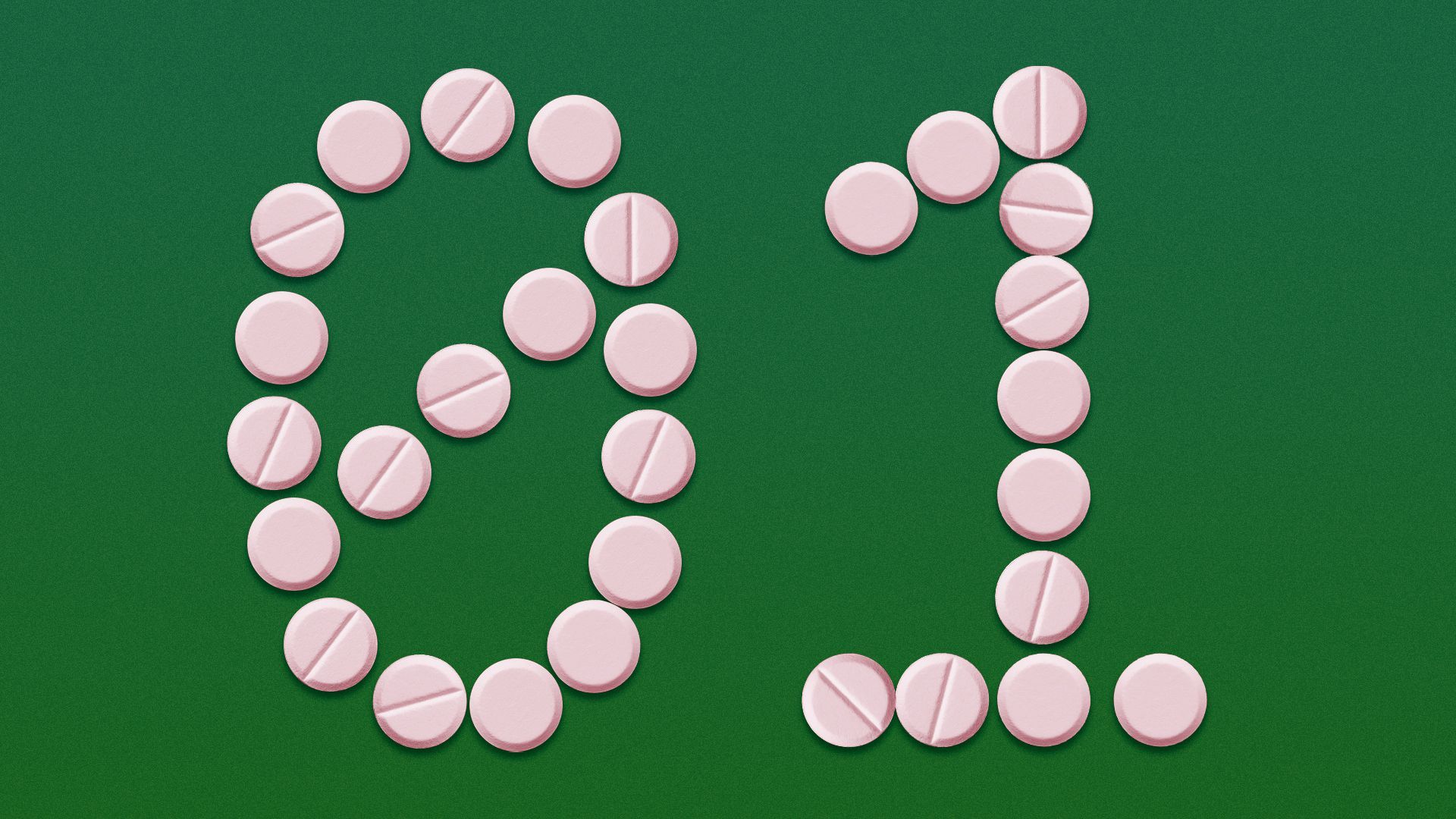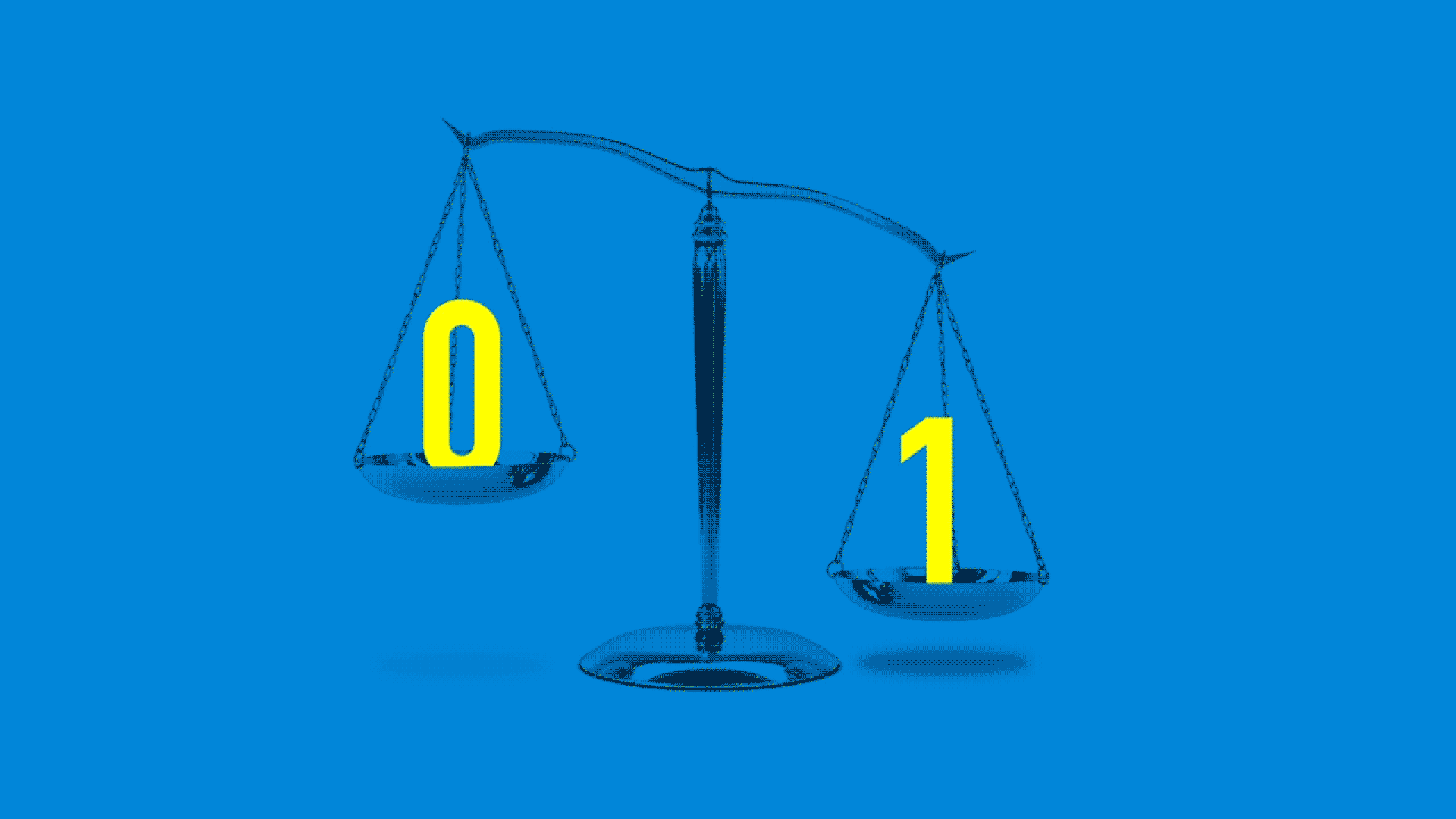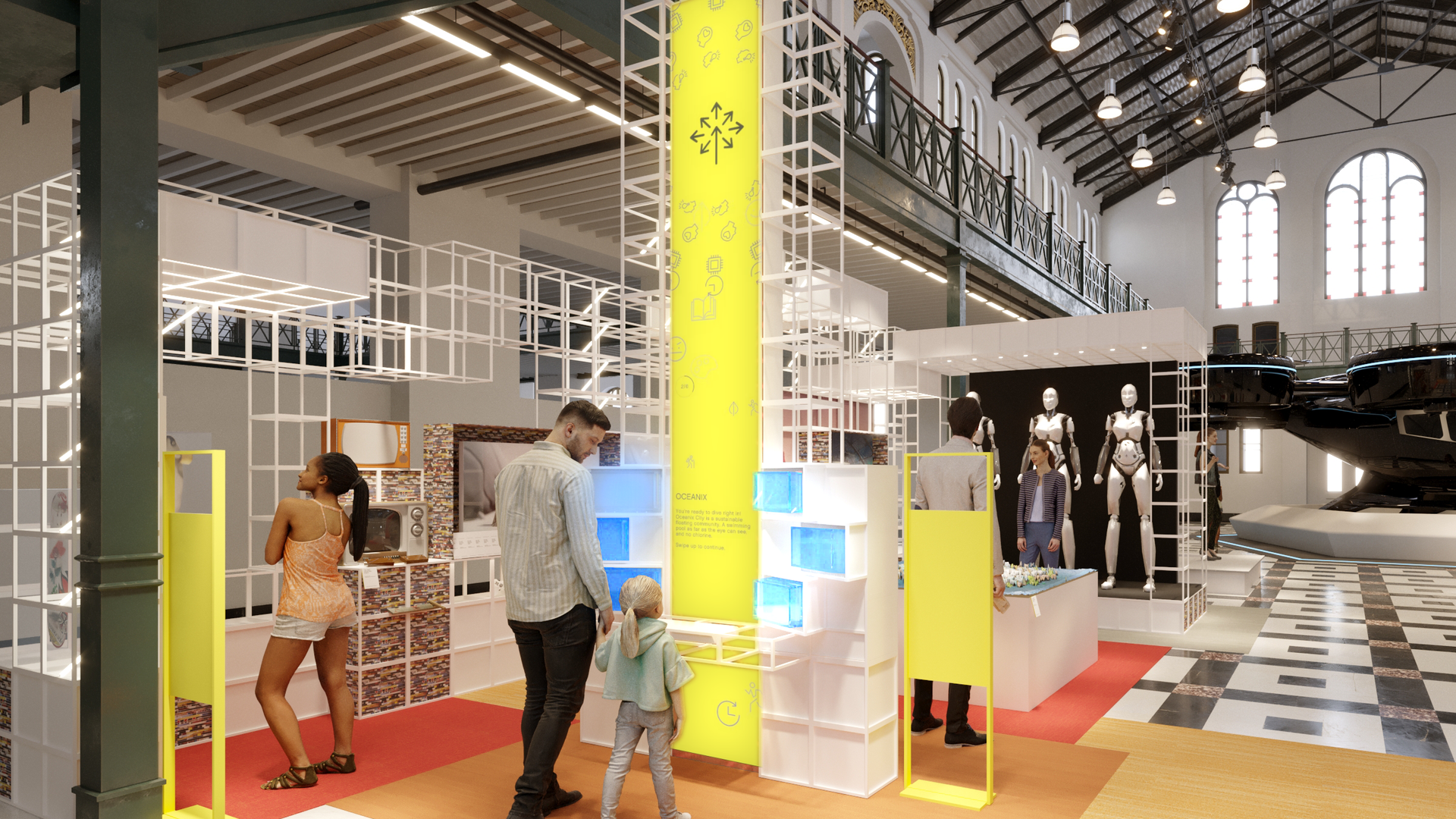| | | | | | | Presented By Uber | | | | Axios Future | | By Bryan Walsh ·Oct 20, 2021 | | Welcome to Axios Future, where after last week's feedback, I have learned my lesson and will never, ever troll San Francisco Giants fans again. If you haven't subscribed, go forth. - Send feedback, tips and — why not — more reasons why I'd be a terrible umpire to bryan.walsh@axios.com.
- 🚨 On Thursday at 11am ET, I'll be moderating a virtual panel on machine learning and national security at Labelbox Accelerate. Register here.
Today's Smart Brevity count: 1,655 words or about 6 minutes. | | | | | | 1 big thing: The AI pharmacist |  | | | Illustration: Annelise Capossela/Axios | | | | Artificial intelligence — the ultimate optimization engine — is meeting one of its biggest challenges: untangling the messy, slow and expensive work of drug development. Why it matters: Even as computing power has gotten faster and cheaper, drugs remain slow and costly to develop, in part because of the sheer work in selecting a candidate and getting it across the finish line. - AI — with its ability to rapidly identify patterns in galaxies of data — can provide a vital shortcut.
What they're saying: "What you're seeing [with AI] is a platform for a new generation of drugs, biologics, life extension, all of which is being built at a rate that is impossible to describe," says Eric Schmidt, former CEO of Google and the co-author of the new book "The Age of AI." The big picture: Drug development is a great business — if you don't mind repeated, expensive failure. - The process of discovering and developing a new drug can take over a decade and costs $2.8 billion on average — and even then, 9 out of 10 therapeutic molecules fail Phase II clinical trials and regulatory approval.
- The possible failure points are many — identifying a candidate drug from the more than 10⁶⁰ atomic configurations that exist in chemical space, optimizing it for delivery, and testing it in animals and humans to see if it is both safe and effective — and they all add to the overall cost of drugs and health care.
- "Imagine you're building 10 skyscrapers, and you can guarantee that nine will crumble," says Isaac Bentwich, CEO of the new AI drug discovery startup Quris. "But you have no idea which ones will fall, so all you can do is build them and charge a higher rent on the one that keeps standing."
- "That's the problem we're trying to solve."
How it works: AI can offer a boost at nearly every point of the drug development cycle, evangelists argue. - Exscientia's "Centaur Chemist" AI platform computationally sorts through and compares millions of potential small molecules, looking for a handful to synthesize, test and optimize in the lab before selecting a candidate for clinical trials — all of which enabled the company to help get a cancer drug into trials in just eight months, compared to a more standard four to five years.
- Quris is working to speed the trial process by testing drugs on miniaturized organs and tissues on a chip that "represent the full genomic diversity of the potential patient population," notes Bentwich, which in turn generates data that can help train its AI platform to predict the clinical safety and efficacy of novel drugs.
- Lantern Pharma is partnering with digital health care company Deep Lens to use AI to match the right kind of novel molecule with the right patient profile for clinical trials for accelerated clinical trials.
- That AI-driven approach "can rescue hundreds of millions of dollars in prior drug development costs by ensuring it's being tested on a very specific patient platform," says Panna Sharma, Lantern Pharma's CEO.
By the numbers: The AI market for pharmaceuticals rose from $200 million in 2015 to $700 million in 2018, and it's projected to grow to $5 billion by 2024, while AI-related job listings in the drug industry have tripled over the past two years. The catch: Even as AI becomes more powerful, the data sets for drug development can involve millions of compounds, which can exceed the capabilities of current machine learning tools. Read the rest |     | | | | | | 2. A startup wants to build ethical AI from the ground up |  | | | Illustration: Lazaro Gamio/Axios | | | | A San Francisco-based startup called Credo AI is emerging from stealth mode and helping companies manage the regulatory and ethical risks of their artificial intelligence products. Why it matters: The more widespread artificial intelligence becomes, the more important it is to build compliance and ethical standards into AI from the start. - To do that, companies will need to bridge the gap between operating machine learning products and understanding how they'll actually act in the real world.
What they're saying: Credo — which has taken in $5.5 million in funding so far — was founded in 2020 with the goal of "asking how we ensure the unintended consequences of AI, which has now become the fabric of our lives, can be managed," says Navrina Singh, a Qualcomm and Microsoft veteran and Credo's co-founder and CEO. - "And we want to promote that accountability among the company, among the stakeholders, among the [larger] ecosystem, and we want to do it at scale."
How it works: Credo tries to do that in part by providing what it calls an "auditable record" of the data and decisions that go into creation, testing, deployment and monitoring of AI products. - "Whether it's your policy team or whether it's your data science team, it allows you to really align on what good looks like," says Singh.
Read the rest |     | | | | | | 3. Smithsonian exhibition explores visions of the future(s) |  | | | A rendering of an exhibit hall in the forthcoming "FUTURES: Beacons" at the Smithsonian Art + Industries Building in Washington, D.C. Credit: Courtesy of LAB at Rockwell Group | | | | "FUTURES" — a multimedia museum experience that teases out possibilities for the future — will open Nov. 20 at the Smithsonian Institution in Washington, D.C. Why it matters: At a moment when public attitudes toward the future can lean toward the dystopian, "FUTURES" aims to open up visitors to various scenarios that they can help create through their choices. What's happening: Axios was given a first look at "FUTURES: Beacons," a part of the overall exhibition, which will be on view at the Smithsonian's Art + Industries Building (AIB). - The name is specifically plural, says David Tracy of the architectural studio LAB at Rockwell Group, which designed "Beacons" with support from investment company Softbank Group and the Institute for the Future.
- "It's not 'the future' — it's 'futures,'" he says. "It suggests there are many possible paths that a future can take."
How it works: To that end, the exhibit will be marked by 10-foot-tall installations called beacons that function as touchstones for visitors making their way through the experience, while "giving people the tools to reflect on a very personal level about the future that they want to see for themselves and the larger world," says Brad McDonald, director of creative media at AIB. - LAB at Rockwell Group has layered together some of the emerging technologies already shaping the future — including ultrasonic haptic controls that allow users to gesture in midair to select choices on a screen — to engage visitors in what futurists call "specificity training."
The bottom line: "By specifically imagining oneself in a future, you can start to tease out whether that's a future you want to make real or be a part of," says Tracy. Share this story, |     | | | | | | A message from Uber | | How Uber's emergency button helps protect its users | | | | In an emergency, every second counts. That's why Uber built an in-app Emergency Button and partnered with RapidSOS to digitally share critical trip information, like your GPS location and car details, with 911 dispatchers. Get more details. | | | | | | 4. The new U.S. information age, in numbers |  Data: Interactive Advertising Bureau; Table: Axios Visuals The U.S. has reached a tipping point in its shift from an industrial economy to an information economy, according to a new study, Axios' Sara Fischer reports. Why it matters: This shift toward a data- and information-based economy has allowed more businesses to establish themselves and scale quickly and at a very low cost. The number of jobs created by the commercial internet has more than tripled since 2012. - The report is published every four years by the Interactive Advertising Bureau and written in conjunction with researchers.
The big picture: The report finds that the internet-supported economy over the past decade has shifted from jobs that relate mostly to technical internet functions, like coding, to jobs that help deliver information and facilitate communication through data. By the numbers: The number of people employed in news and information-related publishing tripled between 2008 and 2020 to more than 142,000 people. - The internet employs almost as many creators (200,000 full-time equivalent jobs) as the rest of the U.S. entertainment industry represented by the largest unions.
- More than half of all U.S. advertising and media employment now comes from the internet, per the report.
Read the rest. |     | | | | | | 5. Worthy of your time | | The key art edition (Rex Sorgatz — Why Is This Interesting) - The recent golden age of TV was defined by iconic key art — think the smoking "Mad Men" silhouette — but Netflix's algorithmic sorting is dumbing it down.
The new question haunting adoption (Olga Khazan — The Atlantic) - With fewer babies being born — and far fewer being given up by birth parents — adoption faces an existential crisis.
Has life gotten better?: the post-industrial era (Holden Karnofsky — Cold Takes) - Understanding what life was really like before the industrial era helps us understand the kind of world we'll want to build.
How a nuclear bomb could save Earth from a stealthy asteroid (Robin George Andrews — New York Times) - Nuclear-based asteroid defense is one of those things you may not want around, but you'll be glad you have it if you need it.
|     | | | | | | 6. 1 work thing: How stress ages CEOs | | A new paper shows that work-related stressors can cause CEOs to age more rapidly — and even die earlier. Why it matters: If work-related stress can cause premature aging in the comforts of the C-suite, imagine what it can do to the rest of us. What they found: In a working paper, researchers collected data on 1,605 CEOs at large, publicly listed firms, and found their lifespans decreased by 1.5 years on average in response to industrywide economic downturns. How it works: Beyond simply calculating mortality, the researchers used neural network-based machine learning techniques trained to assess signs of aging in photo portraits. - Before the 2008 recession, there was little apparent difference in aging between CEOs whose companies would experience financial distress during the crisis and those whose firms wouldn't.
- But beginning with the recession, the CEOs of distressed companies began aging visibly in a way the AI could pick up — on average as much as a year more than CEOs of nondistressed companies.
What they're saying: There's a cost to policies that push employees — even executives — to the max, co-author Marius Guenzel said in a statement. - "If you make them work harder, they might have systematically worse health outcomes in the future."
The flip side: CEOs who served under less stringent corporate governance saw their lifespan increase by two years on average, according to the research. |     | | | | | | A message from Uber | | How Uber's emergency button helps protect its users | | | | In an emergency, every second counts. That's why Uber built an in-app Emergency Button and partnered with RapidSOS to digitally share critical trip information, like your GPS location and car details, with 911 dispatchers. Get more details. | | |  | | It'll help you deliver employee communications more effectively. | | | | | | Axios thanks our partners for supporting our newsletters. If you're interested in advertising, learn more here.
Sponsorship has no influence on editorial content. Axios, 3100 Clarendon Blvd, Suite 1300, Arlington VA 22201 | | | You received this email because you signed up for newsletters from Axios.
Change your preferences or unsubscribe here. | | | Was this email forwarded to you?
Sign up now to get Axios in your inbox. | | | | Follow Axios on social media:    | | | | | |










No comments:
Post a Comment